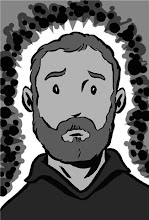PLM: Having written novels and short stories for the likes of Games Workshop and Abaddon as well as Fighting Fantasy books for Wizard Books, how does the challenge of writing an adventure gamebook differ from writing a conventional piece of prose?
JG: In some ways, writing an adventure gamebook is easier than writing long form fiction. Characterization is more straightforward, because other than the protagonist (who is the reader anyway) characters appear only very briefly. Also, psychologically you’re only ever writing a few hundred words at a time, per section, rather than several thousand words for one chapter.
The other thing I like about gamebooks (because I’m quite an indecisive individual) is that you can include every option of what could happen and what you would like to appear within a book.
However, plotting gamebooks is another challenge altogether. Then there’s balancing the game play and the whole muddling up the sections to accommodate clues, puzzle answers and illustrations evenly spaced throughout the finished book.
PLM: One assumes from the number of titles you’ve written for Abaddon and Wizard that you that you have a strong relationship with them. How important is it for writers to develop such a relationship their clients?
JG: I would like to think I have good relationships with all the various publishers I’ve worked for. If you want to make writing your living, then I think it’s very important to develop strong relationships with those who are likely to employ you. Partly because if people know you’re easy to work with and can take criticism well, and meet deadlines (although that last one isn’t always my strongest area), quite simply they’re going to be more likely to come back to you again in the future.
An example of this is that having written my Doctor Who Decide Your Destiny gamebook The Horror of Howling Hill, the editor I had worked with on that title approached me to write a Clone Wars DYD which became Crisis on Coruscant.
PLM: I understand you were a full-time teacher when you first started writing. How long did you wait before leaving your previous profession and becoming a full-time writer? Was it a difficult decision?
JG: Technically, when I started writing I was a full-time student. My first book was published when I was still at university. When I left uni I had a go at being a freelance writer for two years, doing supply teaching to pay the rent. However, I did end up teaching full-time for twelve years. I’ve been a full-time for two years now.
There was a fair bit of soul-searching involved in the decision to give up because I now have a young family. However, as a friend of mine said ‘You’ll never lie on your death-bed wishing you hadn’t given it a go’ and although things haven’t always been easy, I’ve never regretted the decision.
PLM: How challenging was it to balance the rigours of such a demanding job with the time required to get your writing career off the ground?
JG: Very hard. I would be in work for just after seven, leave about eleven hours later, then put the children to bed, have something to eat, do what school work I had to do for the next day and only then could I sit down to write – when I was feeling completely knackered.
And then the weekend came along and that was family time and everything else that’s involved in keeping house and home together.
While I was teaching I was writing one or two books a year. Now it’s about five plus various other projects.
PLM: And, finally, what advise can you offer nascent writers in a similar situation?
JG: If you want to be a writer you need to write – everyday. There’s no point talking about wanting to be a writer unless you’re prepared to put the work in. And you should read everything you can, and not just the sort of thing you want to write either. And develop a very thick skin, ready for all the times people reject your stuff. Oh, and good luck!

If you have enjoyed this blog, please consider making a donation to my preferred charity, the Myasthenia Gravis Association. Thank you.









